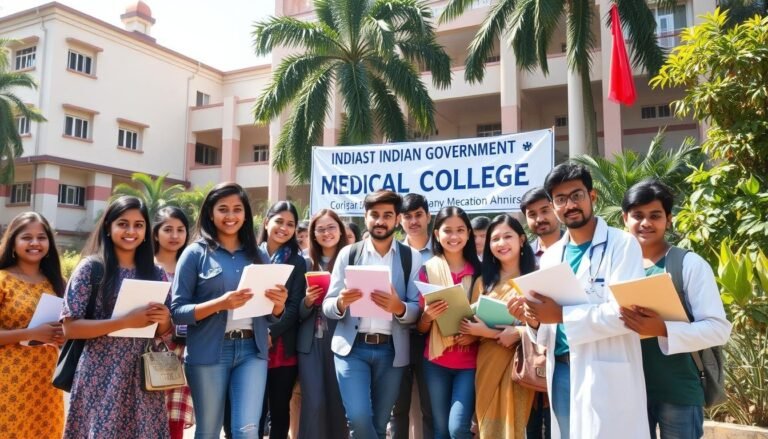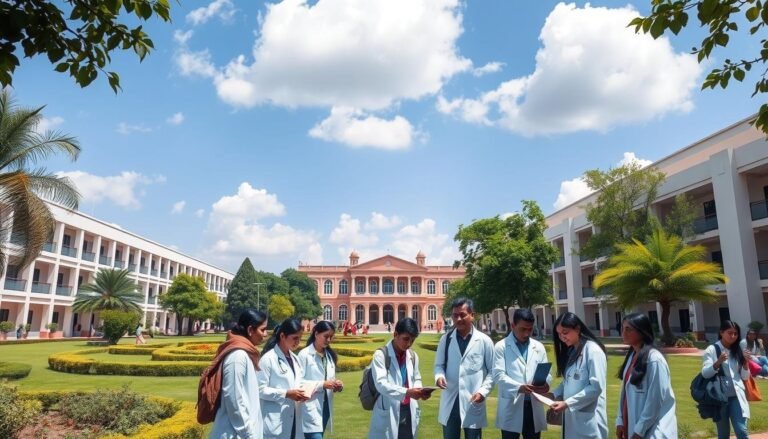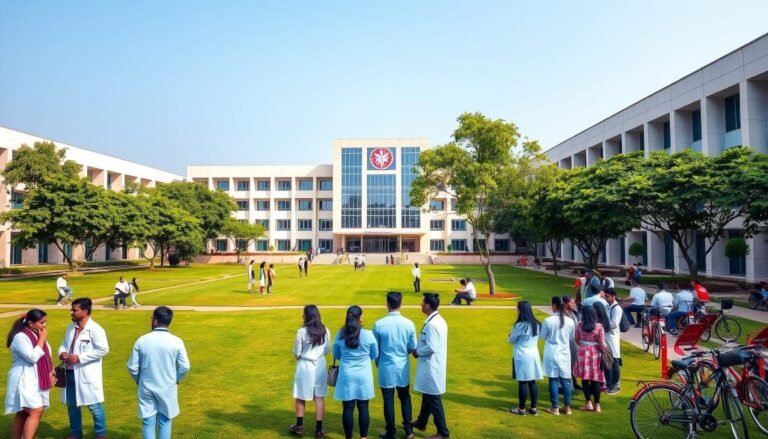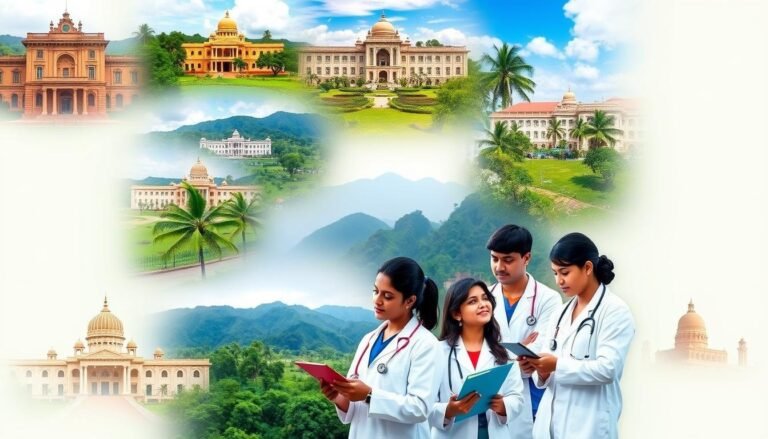List of MCI Approved Colleges In India 2025-26
India’s medical education scene is always changing. Top schools across the country offer great chances for those wanting to be in healthcare. Places like All India Institute of Medical Sciences (AIIMS) in New Delhi and Christian Medical College (CMC) in Vellore are key players. They are helping shape the future of healthcare in India.
But what’s next for medical education in India? What new developments and MCI-approved colleges will shape the future? Let’s dive into the exciting possibilities ahead.

Key Takeaways
- India’s medical education landscape is constantly evolving, with prestigious institutions nationwide offering unparalleled opportunities.
- The latest developments in medical education include the establishment of new medical colleges across various states.
- The MCI (now NMC) has approved a significant number of new medical colleges, expanding access to quality medical education in India.
- The article will provide a comprehensive list of MCI-approved colleges for the 2025-26 academic year, helping aspiring students navigate the medical education landscape.
- Understanding the latest trends and regulations in medical education is crucial for both students and healthcare professionals in India.
Overview of Medical Education in India
India’s medical education system offers a wide range of courses. These courses are available at both undergraduate and postgraduate levels. The main undergraduate program is the MBBS, a 4-year graduate program followed by a 1-year internship.
Postgraduate medical education includes MD and MS, 3-year programs. These programs are offered in various specializations after completing the MBBS degree.
Courses Offered
India’s medical education system includes several degrees. These degrees are in different systems of medicine, such as MBBS, BAMS, BHMS, and BUMS. The MBBS degree is earned after completing a 5.5-year undergraduate program.
It is the standard entry-to-practice degree in modern evidence-based medicine. Postgraduate education in medical specialties requires an additional 3 years of study after MBBS. This leads to an MD or MS.
Eligibility Criteria
Admission to medical colleges in India is based on competitive exams. The National Eligibility cum Entrance Test (NEET) is one such exam. To be eligible for the MBBS program, students must have completed their 10+2 or equivalent with PCB as main subjects.
For postgraduate medical programs like MD/MS, candidates must have a recognized MBBS degree from an accredited university.
The approval of medical colleges in India is regulated by the Medical Council of India (MCI) or the National Medical Commission. Admission to government medical colleges is highly competitive, with a success rate of around 2.32% in 2024. The availability of donation/management-based seats has raised concerns due to the high fees, ranging from ₹50 lakh to ₹2.25 crore per MBBS seat.
New Medical Colleges in India
India’s medical education scene has changed a lot lately. Many states got the green light to start new medical colleges. This move aims to make quality healthcare education more accessible across the country.
Uttar Pradesh will have 22 new medical colleges. Maharashtra and Rajasthan will get 14 and 12, respectively. Telangana and West Bengal will have 11 and 8 new colleges. Madhya Pradesh and Andhra Pradesh will each get 7.
Karnataka and Tamil Nadu will welcome 5 new colleges each. Kerala is set to have 2 new medical institutions. Other states like Uttarakhand, Odisha, and Gujarat will get 2 or 3 new colleges.
Haryana, Delhi, Assam, Punjab, Sikkim, and Tripura will each have one new college. This growth in new medical colleges in India shows the government’s dedication to better healthcare education. It also aims to tackle the shortage of doctors in the country. With more MBBS seats, aspiring medical students will have more chances.
State-wise List of Medical Colleges in India
India has a wide range of medical colleges across its states. The north and south are especially famous for their top medical schools. These schools help meet the need for more doctors and healthcare experts.
North India Medical Colleges
In the north, states like Uttar Pradesh, Rajasthan, Haryana, Delhi, and Punjab have many MBBS seats. These places are known for their strong medical schools and long history of teaching medicine well.
- Uttar Pradesh is home to King George’s Medical University in Lucknow, which takes in over 250 students each year.
- Rajasthan has Sawai Man Singh Medical College in Jaipur, offering great medical education to students.
- Haryana’s Post Graduate Institute of Medical Sciences in Rohtak is known for its new teaching methods and modern facilities.
- Delhi is famous for its top medical schools, like All India Institute of Medical Sciences (AIIMS), which has 100 government seats.
- Punjab’s Government Medical College in Amritsar helps meet the area’s health needs.
South India Medical Colleges
The south, including Karnataka, Tamil Nadu, Andhra Pradesh, and Telangana, has many well-known medical colleges. These states are known for their strong medical education and top-notch healthcare facilities.
- Karnataka’s St. John’s Medical College in Bangalore offers a full medical curriculum.
- Tamil Nadu’s Christian Medical College in Vellore is known for its excellent medical education.
- Andhra Pradesh’s All India Institute of Medical Sciences (AIIMS) in Vijayawada has modern facilities and quality education.
- Telangana’s Osmania Medical College in Hyderabad is recognized for its new teaching methods and focus on research.
| State | Number of Medical Colleges | Government Seats | Private Seats |
|---|---|---|---|
| Uttar Pradesh | 65 | 12,200 | 8,925 |
| Karnataka | 52 | 6,520 | 6,840 |
| Tamil Nadu | 47 | 5,350 | 6,905 |
| Maharashtra | 45 | 6,300 | 6,025 |
| Andhra Pradesh | 33 | 5,775 | 3,970 |
NMC Guidelines for Foreign Medical Graduates
The National Medical Commission (NMC) is in charge of medical education in India. It has set rules for Indian students who get their MBBS degrees abroad. These rules help ensure foreign medical graduates can practice in India.
Indian students who get their MBBS from abroad must follow these steps:
- Finish a 54-month MBBS program, with a 12-month internship.
- Pass the National Eligibility cum Entrance Test (NEET) to get into MBBS programs abroad.
- After getting their MBBS, students must pass the Foreign Medical Graduate Examination (FMGE) by the National Board of Examinations (NBE).
- They also need to do a 12-month internship in India to practice medicine here.
The NMC is a top authority in the world of medical accreditation. The FMGE test is key for foreign medical graduates to show they’re ready to practice in India. Following these guidelines helps Indian students who studied MBBS abroad meet NMC standards. This prepares them to offer quality healthcare in India.
| Key Statistics | Details |
|---|---|
| NMC Screening Test Frequency | Conducted by National Board of Examinations (NBE) twice a year |
| NMC Screening Test Format | 300 MCQs divided into 2 sections |
| Minimum Passing Marks | 50% for MBBS graduates |
| Negative Marking | No negative marking |
| Attempt Limit | No limit on the number of attempts |
The NMC’s rules for foreign medical graduates aim to keep medical education high quality. They make sure Indian students who studied MBBS abroad can practice in India. By following these rules, foreign medical graduates can help India’s healthcare system and offer top-notch medical care.
Why Study MBBS Abroad at NMC Approved Colleges?
Studying MBBS abroad at NMC (National Medical Commission) approved colleges has many benefits. These schools are checked to make sure they offer top-notch medical education. They have modern facilities, skilled teachers, and complete curricula that meet global standards.
Quality of Education
NMC-approved colleges abroad focus on giving a solid medical education. They have the latest in classrooms, libraries, and labs. This means students get to use the newest medical tools and technologies.
Global Exposure
Studying MBBS abroad gives students a worldwide view of medicine. It’s key for learning about different healthcare methods and working with doctors from all over. This prepares students for a global medical career.
Cost-Effectiveness
Medical education costs less in many countries than in India. This makes studying MBBS abroad a budget-friendly choice for many. Students get quality education without the high fees or donations found in India.
Choosing NMC approved colleges abroad means Indian students get a top-notch medical education at a good price. This sets them up for success in their medical careers.
list of mci approved colleges in india
Choosing a medical college in India is a big decision. The college’s reputation and MCI approval are key. The list of MCI approved colleges in India shows the best government and private medical schools.
These colleges offer top-notch education and training. This prepares students for a successful medical career. Getting into these colleges is tough. You need to do well in the NEET exam.
We’ve made a detailed list of the best MBBS colleges in India. These are recognized by the NMC and MCI. You’ll find both government and private colleges on this list. This gives you many options to choose from.
| College Type | Number of MCI Approved Colleges |
|---|---|
| Government Medical Colleges | 0 |
| Private Medical Colleges | 0 |
| Top Medical Colleges in India | 0 |
The table shows the number of MCI approved colleges in India. It breaks them down by government, private, and top colleges. This information helps students understand the medical education landscape in India.
Getting into these colleges is very competitive. It’s crucial to prepare well for the NEET exam. This will help you get into your dream college.
NMC Approved Medical Colleges Abroad
Indian students looking for quality medical education abroad have many options. These colleges offer recognized MBBS degrees and a diverse learning experience. They also have affordable tuition fees.
Russia
Russia is a favorite among Indian medical students. The National Medical Commission (NMC) has approved 54 medical colleges and universities there. Famous schools like Moscow State University and Kazan Federal University are known for their high standards and low costs.
The Russian government also offers scholarships to international students. This makes studying in Russia a good choice for many Indian students.
Kyrgyzstan
Kyrgyzstan is known for its NMC-approved MBBS programs. It has several top medical colleges. These colleges offer affordable and quality education to Indian students.
China
China is a top choice for medical education, with 45 NMC-approved colleges. Universities like China Medical University and Zhejiang University offer excellent facilities. They meet UK’s medical education standards, attracting Indian students.
Philippines
The Philippines is a favorite for Indian and international students. NMC-recognized schools like University of Santo Tomas and Cebu Doctors University focus on practical skills. The English-speaking environment and low tuition fees make it appealing.
Bangladesh
Bangladesh is close to India, culturally similar, and offers affordable medical education. The National Medical Commission (NMC) has recognized many medical institutions there. This gives Indian students a chance to study MBBS in a convenient and affordable setting.
Top Medical Colleges in India
India boasts many top-notch medical colleges, both government and private. Admission to places like AIIMS is tough, based on NEET scores. Yet, private colleges also offer excellent medical education.
Private medical colleges are pricey but known for their modern facilities and expert teachers. They have tough programs that get students ready for medical careers. These colleges offer many special programs to meet different student needs.
Our research shows India has 780 MCI-approved medical colleges, mostly government-run. The best college, Christian Medical College, Vellore, always ranks high in NIRF rankings.
Other top medical colleges in India include:
- All India Institute of Hygiene & Public Health, Kolkata (NIRF Ranking 3)
- Madras Medical College, Chennai (The oldest medical college in India)
- Chittaranjan National Cancer Institute, Kolkata (The youngest medical college in India)
- Delhi University-affiliated medical colleges (4 in total)
These colleges are famous for their great teachers, modern research tools, and detailed curricula. They prepare students well for medical careers.
Studying medicine at these top colleges means getting a great education. It also opens doors to global opportunities and networking. This sets students up for a fulfilling career in healthcare.
Admission Process for Medical Colleges
Getting into India’s top medical colleges is tough. The main way in is through the National Eligibility cum Entrance Test (NEET). This exam is taken by students all over the country.
NEET tests students in Physics, Chemistry, and Biology. Doing well in NEET is very important. It’s the main way to get into most medical schools. Some states also have their own exams for medical school.
Students planning to become doctors need to know a lot about the colleges they want to attend. They must understand the NEET scores needed, how many seats are available, and any extra rules. Being well-prepared is crucial in the competitive admission process for medical colleges.
- The NEET exam is the main way to get into most medical colleges, both government and private.
- Some states also have their own entrance exams for admission to medical colleges within their respective jurisdictions.
- Aspiring students must research the specific admission requirements and processes for the medical colleges they are interested in, including NEET cutoff scores and any additional eligibility criteria.
By staying informed and planning well, students can boost their chances of getting into a top medical college in India.
Conclusion
India’s medical education scene is rich and varied, offering many paths for those who want to be doctors. You can study at top government schools or at NMC-approved colleges abroad. This variety meets different needs and goals.
Our guide has shown you the best places to study medicine in India and abroad. You now know how to apply, what you need to qualify, and what programs are available. This knowledge helps you choose the right path for your future.
Starting your medical studies is a big step. It requires commitment, effort, and a true love for helping others. Wherever you study, the goal is to become a skilled and caring doctor. Let’s explore this journey together, aiming to bring quality healthcare to everyone.





